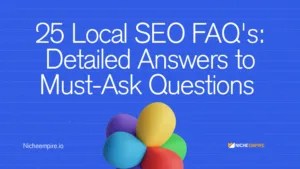Real estate used to thrive well with traditional marketing. Word-of-mouth, prints like newspapers and magazines, networking, and viewings were enough.
Things have changed, and consumer behavior and the rise in online searches have made local search engine optimization essential. According to the National Association of Realtors, 97% of homeowners searched the internet for a new home.
As more people turn to Google and other search engines to find properties, they need to see you. Local search engine optimization (SEO) can help you achieve that by making you appear high on online searches in your location.
Read on to learn about effective local SEO for real estate professionals.
Summary
- Why is Local SEO Important for Real Estate?
- Effective Local SEO Strategies For Real Estate Professionals
- Final Thoughts
- Frequently Asked Questions
Why is Local SEO Important for Real Estate?
Properties are location-specific, which is where local SEO thrives. Local SEO for real estate makes you more visible as people search engines like Google to find properties around you.
Ranking high on local searches improves brand awareness, leads generation, and conversion. Here’s why ranking high on local searches matters.
1. Competition
As of 2024, there were over 1.5 million realtors in the US (National Association of Realtors). This includes sales agents and those with broker and associate broker licenses.
The competition is fierce, and it hasn’t gotten any better following the post-pandemic real estate surge. When you search online, you will probably choose from the first page. That is exactly what your clients also do, and ranking high gets their attention.
2. Increased Visibility
Appearing on the first page of search results means more people get to see you, your listings, and your contact information. This improves your reach, brand awareness, and credibility.
3. Higher Conversion Rates
People searching for properties nearby are more likely to be in the ready-to-buy stage. This means you have a higher chance of conversion from local SEO.
4. Increased Local Trust
Ranking high on local searches shows that you are trustworthy. Your potential clients will see your reviews, content, and other ranking criteria, which will help build trust with prospects.
Effective Local SEO Strategies For Real Estate Professionals
Let’s get started on the processes of local SEO for real estate.
1. Conduct Local Keyword Research
Your potential local clients search online using specific terms and phrases with locations – local keywords. Conduct detailed keyword research using SEO tools to find these keywords.
The aim is for you to appear high on local search results when people look up some keywords in your target area.
- Location-specific keywords could be: “Realtors in Austin,” “Real estate services in Denver,” “Studio apartment in West Orange,” and “Property Management in Orlando.”
- Include the relevant keywords in your profiles online and use them to create content targeting your desired locations.
Niche Empire, Ubbersuggest, Google Keyword Planner, and SEMrush can help you find relevant local real estate keywords. This will help you tailor your content to their needs and queries.
Learn how to conduct local keyword research.
2. Competitor Analysis
There is competition in every business, and real estate is not exempt. As a real estate professional, leveraging your competitor’s weaknesses gives you an edge.
You have to study your competitors’ strategies, keywords they are ranking for, and gaps. Use their strengths and weaknesses to refine your SEO approach and increase your rank in local searches.
Check out our step-by-step guide on SEO competitor analysis.
3. Optimize Google Business Profile(GBP)
Besides listing your business on Google Business Profile, you need to optimize it to attract clients nearby. This is central to local SEO for real estate professionals because it makes you appear in local search results and Google Maps.
To optimize your GBP, you need to:
- Choose the relevant business category for real estate.
- Provide accurate business name, address, and phone number (NAP)
- Include your website and working hours.
- Include your services and an informative business description.
- Add high-quality images or videos.
- Ask for reviews and respond to all reviews and inquiries.
- Update your business information regularly.
4. Optimize Your Website for Local Reach
Optimize your website with local keywords to improve your visibility on local search results.
Here’s how:
On-Page Optimization
On-page Optimization is a crucial part of SEO that involves enhancing your web page content for your audience and search engines.
- Add your location to your website’s content – title tags, headers, and meta descriptions.
- Ensure your NAP and other business information is consistent.
- Create separate service or landing pages to target specific areas or neighborhoods.
- Create individual agent profile pages if you have many agents.
- Embed a Google Maps on your contact page so clients can easily locate your address.
- Add local schema markup to your website. This is relatively easy to do if you have a WordPress website.
Mobile Optimization
A mobile-friendly website is essential because most searches are made on mobile devices. This is what you need to do.
- Make your website design responsive to different screen sizes.
- Enable browser caching and compress image files to make your site fast-loading.
- Simplify your website menu, make buttons touch-friendly, and make CTA prominent to enhance mobile navigation.
- Optimize your web content for mobile by using readable font size and white space.
Find out more about mobile SEO.
5. Create Authentic Content 
Use your keywords to create high-quality content that answers your clients’ intentions.
- You can write blog posts, case studies, local guides, and FAQs that resonate with your target audience. It could be about local news, events, or community-related topics.
- Include your local keywords in your title tags and meta descriptions.
- Structure your content using H1, H2, and H3 tags and bullet points to break texts.
- Images, infographics, and videos are also suitable forms of content that you can use to engage your audience.
- Include visuals in your written content to increase the appeal and repurpose your blog posts into short videos or infographics.
Most importantly, make your content value-packed with practical advice, market insights, and property highlights. Always ensure your content is crafted to meet the demand of your target location.
6. Build Local Citations
Local citations are excellent for building credibility and brand awareness and are vital for local SEO for real estate. They verify your business’s legitimacy, improve local rankings, and drive traffic to your website and office.
- List your business on reputable and relevant local directories like Yelp, Yellow Pages, Bing Places for Business, Apple Maps, and real estate directories.
Ensure your NAP is the same across all directories and platforms.
7. Seek for Online Reviews
Online reviews and ratings boost trust, which impacts conversion and local rankings.
- Encourage satisfied customers to leave their reviews on Google Business Profile and other online platforms.
- Promptly respond to positive and negative to prove you value feedback.
- Monitor your reviews and address issues to satisfy your clients.
8. Build Local Backlinks
Backlinks are links from other websites to your web pages. They are vital ranking factors that signal search engines that your website contains valuable content.
- You can seek backlinks from community websites, local businesses, and organizations.
- Sponsoring local events and listings on event websites can also get you backlinks.
- You can build backlinks by joining and participating in local organizations like the local chamber of commerce.
9. Periodic SEO Audits
Regularly monitor your local SEO performance, showing you if your strategy works and what can be done.
Consider these when conducting a local SEO audit:
- Content Relevance: Is your content valuable to your target audience? A high-performing post indicates its relevance, while an underperforming post might need updating.
- Ranking: What keywords are you ranking for, or have your rankings dropped?
- On-page Optimization: Is your content structure easy to follow and comprehend? Are there any broken links, and are the titles, images, and meta descriptions optimized?
- Website Performance: Do your website visitors have a good user experience? Is your site loading fast and mobile-friendly, and how easy is navigation?
You can use Google Search Console to track your website’s performance and Google Analytics for traffic and web user behavior.
Google Business Profile insight can help monitor the performance of your listing, the clicks, views, and calls.
Final Thoughts
Local SEO for real estate provides a cost-effective way to boost visibility and credibility in local search results.
Find relevant local keywords, list your business on local directories, collaborate with local businesses, and create content that suits local concerns.
Stay consistent, and in a short while, you will soar high online when people nearby make real estate searches.
If you found this helpful, kindly share it with others who might need it.
Frequently Asked Questions
Does Local SEO Work For Real Estate Agents?
Yes, local SEO can help real estate agents reach more people actively searching for properties in nearby searches.
Does SEO Work for Realtors?
SEO works for realtors, which makes local SEO for real estate helpful. More people search on search engines like Google to find realtors, real estate information, and properties.
SEO can make you appear high on search results when people who need your services make online searches.
How Much Does Real Estate SEO Cost?
The cost of SEO for real estate will depend on several factors;
- SEO needs – on-page SEO, technical SEO, off-page SEO, etc.
- Comprehensive SEO package or selected SEO features.
- Number of target locations.
- SEO freelancer or agency.
The cost varies; these factors will determine how much it will cost.



